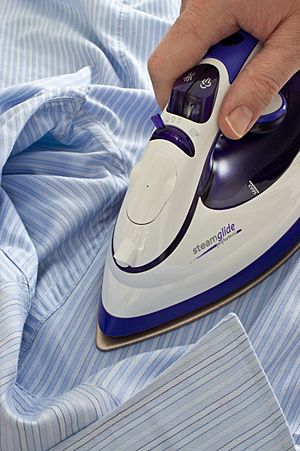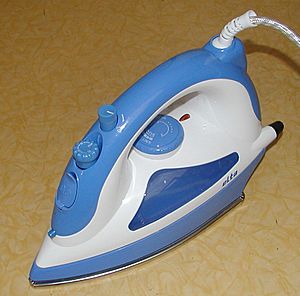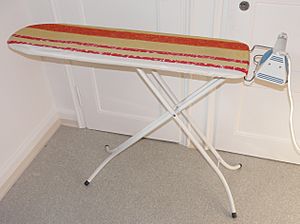Ironing facts for kids
Ironing is when you use a hot tool called an iron to make clothes and other fabrics smooth and remove wrinkles. The iron heats up to about 180–220 degrees Celsius, depending on what kind of fabric you are ironing. Ironing works by making the tiny parts (called molecules) that make up the fabric fibers move around more freely. While the fabric is hot, the weight of the iron straightens the fibers. As the fabric cools down, it stays in its new, smooth shape. Some fabrics, like cotton, need a little water to help the fibers relax even more. Many modern fabrics, made since the mid-1900s, are designed so they don't need much ironing at all. For example, Permanent press clothing was created to reduce ironing by mixing wrinkle-resistant polyester with cotton.
People have been using heated metal to smooth clothes for a very long time, with the first known use happening in China. The electric iron, which we use today, was invented in 1882 by Henry W. Seeley. He received a patent for his "electric flatiron" on June 6, 1882.
Tools for Ironing
The Iron Itself
The iron is the small machine you hold to get rid of wrinkles. It's also known as a clothes iron, flat iron, or smoothing iron. The flat part at the bottom that touches the fabric is called the sole plate. When you iron, you use different types of energy: heat from the iron, chemical energy in the fabric, electrical energy to power the iron, and mechanical energy from your movement.
The Ironing Board
Most ironing is done on an ironing board. This is a small table that you can usually fold up, and it has a surface that can handle heat. Some special ironing boards used in businesses even have a heater inside and a vacuum that sucks air through the board to help dry the clothes.
The idea for an ironing table that made it easier to press sleeves and pant legs was patented in 1858 by W. Vandenburg and J. Harvey. A truly portable, folding ironing board was first patented in Canada in 1875 by John B. Porter. His invention also included a part you could remove to press sleeves. Later, in 1892, Sarah Boone received a patent in the United States for making improvements to the ironing board, which helped people iron shirt sleeves even better.
Images for kids
See also
 In Spanish: Planchado para niños
In Spanish: Planchado para niños
 | Kyle Baker |
 | Joseph Yoakum |
 | Laura Wheeler Waring |
 | Henry Ossawa Tanner |







